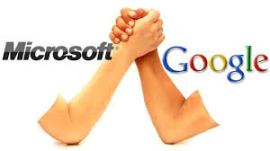The appointment last week of Satya Nadella to lead Microsoft got me thinking about another company: Google. There are many points of similarity between the two companies, but the differences are key.
Both companies are effectively monopoly businesses. Microsoft was and on the desktop perhaps still is an OS software monopoly. Until recently with the rise of tablets and smartphones, Microsoft never faced real competition in its market. Similarly, Google possesses roughly 2/3 market share in the online search industry and its share of online search profits are higher. Like the Microsoft of yore, Google faces few credible threats to its core search monopoly. Bing and Yahoo’s efforts have largely failed, and the worry of Facebook challenging Google through social search is much more benign than once thought.
Microsoft and Google’s monopolies in their respective core businesses leads to two of the biggest cash machines the business world has ever seen: Windows and AdWords/AdSense. Both businesses are high margin and throw off tons of cash. This has given both companies incredible leeway to do three things: #1. Enter new lines of business; #2. Be highly acquisitive in support of #1; and #3. Retain talent.
I think this is where the comparisons between the two companies largely ends. The main difference I see is that Google is ambitious in a way that Microsoft never was and no other company is, and Google is much smarter at building around its core search business. These are two sides of the same coin.
On the one hand, Google is expanding into new areas far afield from core search. Take Google’s well publicized self-driving cars initiative. This requires a huge level of technical talent and investment that very few companies can make. It’s also incredibly audacious and a potentially huge new business for Google. Compare this to say Microsoft’s Xbox effort. Xbox has been Microsoft’s most successful consumer business and its a great product (I own one). Having said that, I’d argue that it’s a less ambitious effort than something like self-driving cars and the potential size of the business is more limited. Google is tackling huge, unsolved technology problems with much larger market opportunities.
Aside from more ambitious efforts to expand beyond its core business, Google is also much better at and more strategic about defending and growing its core. Microsoft is limited in some ways because it’s much harder to introduce new products that monetize off of the Windows monopoly, whereas Google has plenty of options to introduce new products that monetize off of core search and its ad platforms.
For example, Microsoft’s efforts at building an online business – Bing, MSNBC, etc. – have a completely different monetization model than Windows. Ditto for Windows Mobile. You could argue that Windows Mobile makes it easier for Microsoft to retain its desktop users and therefore defends their OS monopoly, but the only way they’ve made new revenue off of Windows Mobile is by selling licenses to smartphone OEMs and now by selling Nokia hardware bundled with Windows.
Contrast this with Google where much of what it does not only defends its search monopoly, but also grows it and creates revenue. Whereas Microsoft started off by licensing its Windows Mobile platform to OEMs, Android is free. Google did this because Google is able to earn money off of mobile search ads. It’s a way for Google to protect its core business as user’s spend more of their online time on mobile devices. Similarly, Google Glass and self-driving cars may very well end up monetizing primarily through serving ads off of Google’s existing platform.
To summarize it all, I think Google is far more ambitious in entering potential new businesses than any large tech company today, and its in a much better position to defend and grows it search monopoly than Microsoft was with Windows. AI have no doubt that Google will be the world’s most valuable company in the not-so-distant future, and that it will be the first company in history to reach $1 trillion of market cap.

Leave a comment